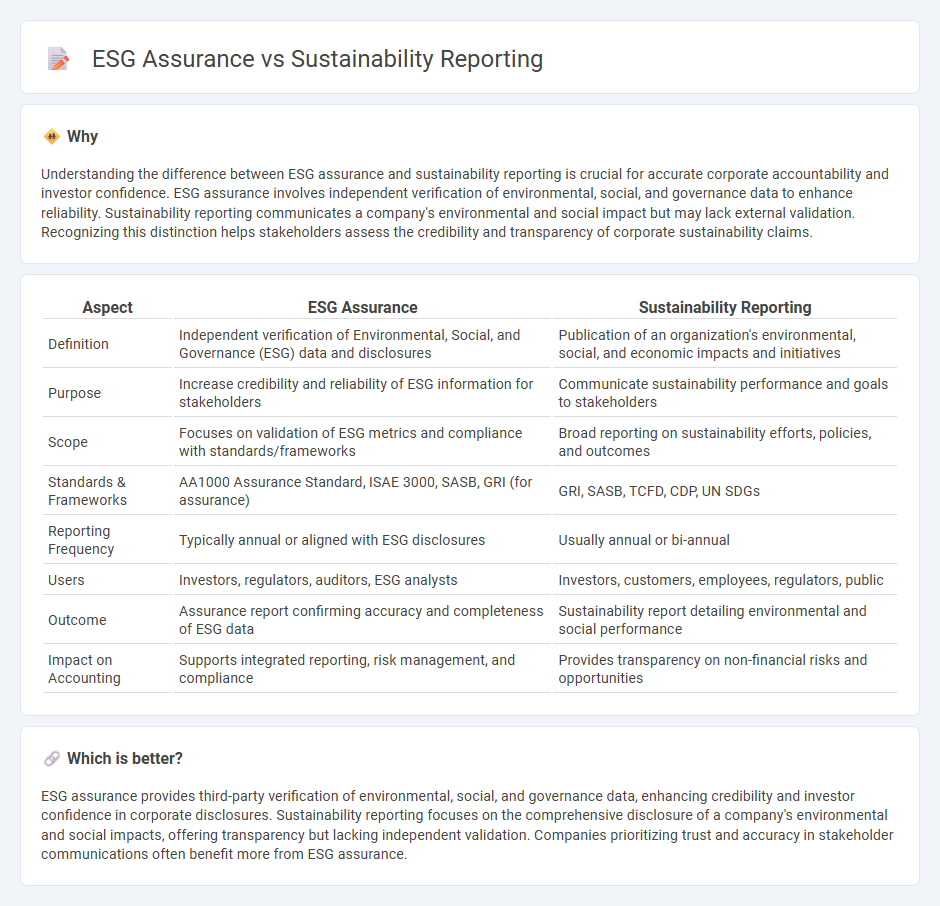
ESG assurance focuses on verifying the accuracy and reliability of environmental, social, and governance data disclosed by companies, ensuring stakeholders can trust reported performance metrics. Sustainability reporting, on the other hand, involves the comprehensive communication of an organization's environmental impact, social responsibility initiatives, and governance practices often detailed in annual or integrated reports. Explore deeper insights into how ESG assurance enhances the credibility of sustainability reporting frameworks.
Why it is important
Understanding the difference between ESG assurance and sustainability reporting is crucial for accurate corporate accountability and investor confidence. ESG assurance involves independent verification of environmental, social, and governance data to enhance reliability. Sustainability reporting communicates a company's environmental and social impact but may lack external validation. Recognizing this distinction helps stakeholders assess the credibility and transparency of corporate sustainability claims.
Comparison Table
| Aspect | ESG Assurance | Sustainability Reporting |
|---|---|---|
| Definition | Independent verification of Environmental, Social, and Governance (ESG) data and disclosures | Publication of an organization's environmental, social, and economic impacts and initiatives |
| Purpose | Increase credibility and reliability of ESG information for stakeholders | Communicate sustainability performance and goals to stakeholders |
| Scope | Focuses on validation of ESG metrics and compliance with standards/frameworks | Broad reporting on sustainability efforts, policies, and outcomes |
| Standards & Frameworks | AA1000 Assurance Standard, ISAE 3000, SASB, GRI (for assurance) | GRI, SASB, TCFD, CDP, UN SDGs |
| Reporting Frequency | Typically annual or aligned with ESG disclosures | Usually annual or bi-annual |
| Users | Investors, regulators, auditors, ESG analysts | Investors, customers, employees, regulators, public |
| Outcome | Assurance report confirming accuracy and completeness of ESG data | Sustainability report detailing environmental and social performance |
| Impact on Accounting | Supports integrated reporting, risk management, and compliance | Provides transparency on non-financial risks and opportunities |
Which is better?
ESG assurance provides third-party verification of environmental, social, and governance data, enhancing credibility and investor confidence in corporate disclosures. Sustainability reporting focuses on the comprehensive disclosure of a company's environmental and social impacts, offering transparency but lacking independent validation. Companies prioritizing trust and accuracy in stakeholder communications often benefit more from ESG assurance.
Connection
ESG assurance enhances the credibility of sustainability reporting by providing independent verification of environmental, social, and governance data. This verification process ensures accuracy, transparency, and stakeholder trust in reported sustainability metrics. Integration of ESG assurance into sustainability reporting supports regulatory compliance and informs better investment decisions.
Key Terms
Materiality
Sustainability reporting emphasizes identifying and disclosing material environmental, social, and governance (ESG) issues relevant to a company's operations and stakeholder interests. ESG assurance provides an independent verification of the accuracy and completeness of these reported material aspects, enhancing credibility and investor confidence. Explore how aligning sustainability reporting with ESG assurance can optimize transparency and stakeholder trust.
Non-financial disclosure
Sustainability reporting involves the systematic disclosure of an organization's environmental, social, and governance (ESG) impacts, highlighting non-financial data such as carbon emissions, labor practices, and community engagement. ESG assurance independently verifies the accuracy and reliability of these non-financial disclosures, enhancing stakeholder trust and regulatory compliance. Explore in-depth insights to understand how robust ESG assurance strengthens sustainability reporting frameworks.
Third-party verification
Third-party verification enhances the credibility of sustainability reporting by independently validating the accuracy and reliability of disclosed environmental, social, and governance (ESG) data. ESG assurance provides stakeholders with confidence in a company's commitment to transparency and ethical practices through rigorous assessment frameworks by accredited auditors. Explore how third-party verification strengthens ESG assurance to drive more informed investment and corporate decision-making.
Source and External Links
What is Sustainability Reporting? - Sustainability reporting is a non-financial reporting method that enables companies to communicate their progress on environmental, social, and governance (ESG) parameters, helping them assess risks and opportunities, improve transparency, and align with CSR goals for long-term value.
Sustainability Reporting: Frameworks, Benefits & Challenges - This practice involves publicly disclosing a company's ESG performance, often using frameworks like GRI or ESRS, to enhance accountability, support regulatory compliance, and strengthen reputation and long-term business growth.
Sustainability reporting - Sustainability reporting refers to the voluntary or mandated disclosure of qualitative and quantitative ESG information to stakeholders, improving corporate transparency and engagement, with regulations such as the EU's CSRD governing certain companies.
 dowidth.com
dowidth.com